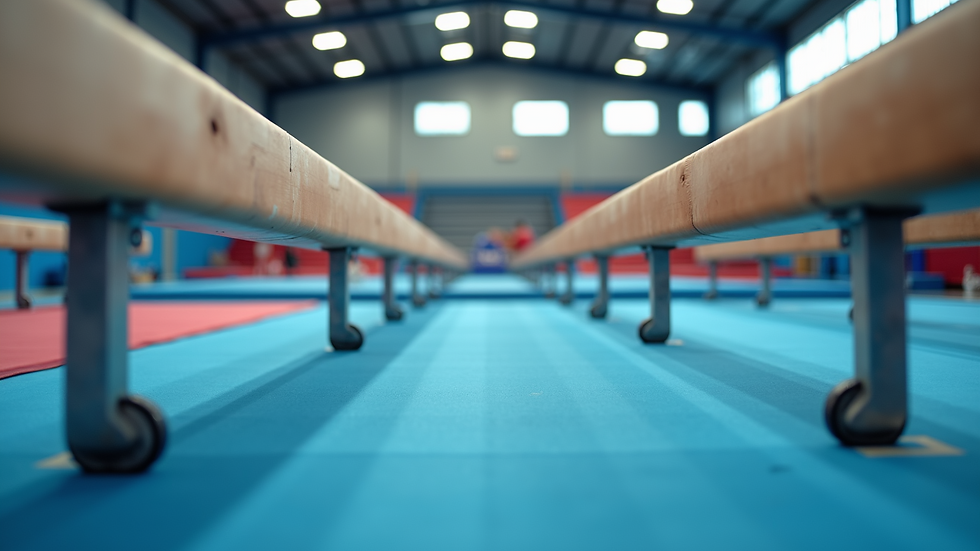From Fear to Focus: Mental Strategies for Confident Gymnastics
- Dr Paul McCarthy

- Jul 28, 2025
- 3 min read
Gymnastics is a thrilling sport that combines athletic ability with mental toughness. One of the biggest hurdles for gymnasts at all levels is overcoming fear in gymnastics. This fear can come from worries about performing complex skills, the pressure of competition, or the discomfort of trying something new. In this post, we will discuss effective mental strategies for gymnasts that can transform fear into focus, boosting gymnastics confidence and overall performance.
Understanding Fear in Gymnastics
Fear is a natural part of sports, particularly in gymnastics where high-risk moves are standard. Many gymnasts feel anxious before performing, especially after experiencing falls or injuries, which can lead to performance anxiety. For instance, a study found that around 70% of gymnasts report some form of competition anxiety.
Recognizing that fear is a normal part of the athlete's journey can help lessen the pressure during practices and competitions. When gymnasts understand that many of their peers face similar fears, they can feel supported and empowered.
Building a Strong Foundation: Mental Preparation
Before managing fear, gymnasts should focus on creating a strong mental base with gymnastics mindset training. Techniques like visualization, affirmations, and positive self-talk can be beneficial.
Visualization Techniques:
Imagine executing your routine flawlessly. Visualize every movement, from the sensation of being airborne to the joy of a perfect landing. This mental rehearsal prepares both your body and mind. Research shows that mental practice can improve performance by up to 20%.
Affirmations:
Write down positive affirmations that reinforce your self-belief. Simple phrases such as “I am strong and capable” or “I trust my training” can make a huge difference. Speaking these affirmations daily helps build a resilient mindset. For example, gymnasts who affirm their skills regularly report higher confidence levels.

Coping with Nerves and Focus Techniques
When it’s time for competitions, nerves can disrupt a gymnast’s focus and lead to mental blocks in gymnastics. Mastering focus and concentration techniques is key to performing at your best.
Breathing Exercises:
Deep breathing can effectively calm nerves. Inhale deeply through your nose for a count of four, hold for four seconds, then exhale slowly through your mouth for four counts. This helps slow down your heart rate and centers your mind, creating a state of readiness. Studies show that deep breathing can reduce anxiety levels by nearly 40%.
Grounding Techniques:
Focusing on your senses can help you stay present. Pay attention to the feel of the mat beneath your feet or the texture of the equipment. Engaging with your surroundings can push aside negative thoughts, keeping you focused on your performance.
Mental Toughness: Embracing Challenges
Building gymnast mental toughness is essential for achieving long-term success. Often, fear arises from a lack of confidence, making it crucial to develop resilience when facing challenges.
Incremental Skill Development:
Rather than diving into complex maneuvers, break skills down into smaller steps. For example, if you're learning a backflip, practice the jump height first and then progress to the flip. This gradual practice allows you to celebrate small wins and fosters confidence. Research suggests that athletes who set small, achievable goals are more likely to build lasting confidence.
Setting Realistic Goals:
Setting achievable, meaningful goals can shift fear into motivation. Rather than comparing yourself to others, focus on personal improvement. Define goals on daily, weekly, and monthly bases to create a clear pathway to success. For instance, aim to improve your flexibility by 10% over the next month.
Overcoming Mental Blocks
Mental blocks can appear suddenly and impact your performance. Identifying and managing these blocks is vital for confident gymnastics. Here are a few strategies:
Identify Triggers: Recognize situations that evoke fear or doubt. This awareness helps you prepare mentally, reducing anxiety for future performances.
Seek Support: Discuss your fears with coaches, teammates, or sports psychologists. Sharing your experiences can alleviate their intensity and open doors for solutions.
Positive Reinforcement: After overcoming a fear, acknowledge your success. This reinforcement solidifies the positive experience in your mind, making it easier to face similar challenges later.
Transforming Fear into Focus with Mental Strategies
Fear is an unavoidable aspect of any sport, but with effective mental strategies, gymnasts can turn that fear into focus and determination. Emphasizing gymnastics mental preparation, developing coping techniques for nerves, and building gymnastics confidence through small victories are vital parts of this process.
Overcoming fear in gymnastics is more than just mastering specific skills; it's about creating a resilient mindset that excels under pressure. By applying these strategies, gymnasts can enhance their performance and rediscover the joy of their sport without being encumbered by fear. So, strap on your gear, embrace the challenge, and remember: every practice is a step toward becoming a more confident and capable gymnast!









